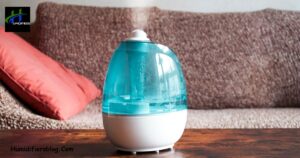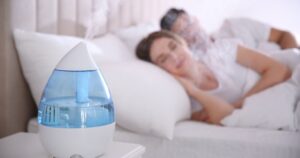Running a humidifier in your bedroom depends on need. Generally, aim for 30-50% humidity. Start by running it for a few hours and adjust based on comfort. Too much can cause dampness, while too little might not help with dryness.
Well, here’s the lowdown: figuring out how long to run a humidifier depends on your room’s dryness. To nail it, start with a few hours and adjust as needed for that sweet spot of comfort. Keep an eye out for excess moisture, though, too much can cause trouble. So, got your answer on how long should you run a humidifier in a bedroom?
Running a humidifier in your bedroom serves a purpose: managing moisture levels. It’s a balancing act, finding the right duration. Start slow, for a few hours, then gauge the air’s feel. Adjust based on comfort; that’s the key. Too much moisture breeds issues, too little won’t help dryness. So, finding the sweet spot matters most.
Bedroom Humidifiers
Bedroom humidifiers are like moisture magicians. They pump moisture into your room’s air. That helps fight off dryness, especially in winter or in dry climates. They’re handy gadgets that make breathing easier and can even help with snoring or dry skin.
These little machines work by releasing water vapor, turning your room into a cozy oasis. They come in different types, like cool mist or warm mist. And they’re pretty easy to use. Just fill ’em up, plug ’em in, and let ’em work their magic while you sleep.
Optimal Duration For Bedroom Humidifiers
The ideal time for a bedroom humidifier depends on the air. Aim for 30-50% humidity just right for comfort. Begin with a few hours, then see how it feels. Adjust to what suits you best; it’s all about finding that perfect balance. Too much moisture can lead to problems, while too little won’t solve dryness.
| Humidifier Duration | Recommended Time |
| Initial Trial | Few hours |
| Adjustment Period | Based on comfort |
| Ideal Range | Balance needed |
| Summer Use | Shorter durations |
| Overall Maintenance | Monitor regularly |
Factors Affecting Humidifier Runtime
The runtime of a humidifier can change due to different factors. Room size plays a big role. A larger room might need more time to reach the ideal humidity. Another factor is the distilled water for humidifier you’re aiming for. If it’s very dry, the humidifier might need more hours to work its magic.
External conditions can affect how long your humidifier runs. Weather plays a part if it’s super dry outside, your humidifier might need more hours to maintain the desired humidity indoors. Another factor is how often you open doors and windows.
Balancing Health With Humidification

Keeping healthy means finding the right balance with humidity. Too much moisture can invite mold and bacteria into your space, causing problems for your health. On the flip side, air that’s too dry might lead to irritated sinuses and parched skin.
Balancing health and humidification means understanding your environment. Factors like weather and where you live play a role. Pay attention to how your dry throat or stuffy nose might signal you need more moisture.
Nighttime Humidifier Usage Tips
Nighttime humidifier use can be tricky, but these tips can help. First off, clean your humidifier regularly to avoid mold and bacteria buildup. Set the humidity level between 30-50% for optimal comfort.
Also, place the humidifier at a safe distance from your bed to prevent dampness. Consider using distilled water to avoid mineral buildup in the machine. And always keep an eye on the humidity levels, too much moisture can lead to issues, while too little won’t solve dry air problems.
Monitoring Bedroom Humidity Levels
Monitoring bedroom humidity is important for comfort and health. Use a hygrometer, a simple device, to measure humidity levels easily. Aim for a range between 30-50% for optimal comfort. If it’s too dry, consider using a humidifier; if too damp, ventilate the room.
Excessive humidity can lead to mold growth and discomfort, while low humidity can cause dry skin and respiratory issues. Regularly check and adjust humidity levels using the hygrometer to maintain a healthy and comfortable atmosphere in your bedroom. Keeping an eye on humidity ensures a pleasant environment for relaxation and better sleep quality.
Risks Of Prolonged Humidifier Operation
Extended use of a humidifier can lead to risks. Too much moisture in the air might trigger mold growth. That mold can cause respiratory problems, especially for those with allergies or asthma. Plus, excessive humidity could damage furniture or promote dust mites, not great for allergies either.
Bacteria and germs can thrive in a humid environment. If the water in the humidifier isn’t changed regularly, these nasties can get into the air. Breathing them in might lead to infections or worsen existing conditions. Always keep an eye on humidity levels and maintain your humidifier well to avoid these risks.
Seasonal Adjustments For Humidifiers

Humidifiers need a seasonal switch-up to match changing weather. In winter, when the air gets bone-dry, crank it up. Aim for around 30-50% humidity for cozy comfort. Come summertime, ease off. Warmer air holds more moisture, so dial it back to prevent excess dampness. Adapting your humidifier to the season keeps your room feeling just right.
Don’t forget the maintenance! Before storing the humidifier in a bedroom away for warmer months, give it a good clean. Bacteria love moisture, so keeping it tidy avoids funky smells and potential health issues. When winter rolls back around, pull it out, clean the humidifier in a bedroom again, and it’s ready to combat that dry air once more.
Frequently Asked Questions
Can I open the window with a humidifier?
Opening a window while using a humidifier can help regulate humidity. It lets fresh air in, preventing the room from getting too stuffy.
Which humidifier is best warm or cool?
The best humidifier, warm or cool, depends on what suits you. Warm mist heat water to make steam, great for soothing congestion.
Can we use a humidifier in the summer?
Using a humidifier in summer can still be helpful. Even though it’s warm, air conditioners can zap moisture, making the air dry indoors.
Conclusion
Managing a humidifier in your bedroom is about finding balance. Start with a few hours to gauge comfort and adjust accordingly. Too much moisture causes problems, while too little won’t help dryness. It’s a delicate equilibrium between comfort and avoiding excessive dampness.
Air conditioners can make indoor air dry, affecting breathing. But be mindful that too much moisture during warmer months can feel sticky. Adjust run times and settings to maintain a comfortable environment. Ultimately, the key lies in finding that sweet spot for a cozy, moisture-balanced room.










